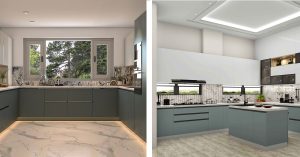Financing option makes home improvement more attainable
FAMILY FEATURES
For younger homeowners and first-time homebuyers in particular, money is likely to be tight. When most available cash is directed to the best possible down payment to secure a home in a desired neighborhood, there’s often little left for improvements.
According to a Profile of Buyers’ Home Feature Preference Report from the National Association of Realtors, 53% of homebuyers took on a home improvement project within three months of buying with kitchen projects being a priority for 47% of those surveyed. However, when buyers finance a home renovation into their mortgage application, they can broaden their options of available properties to include fixer-uppers that can be upgraded prior to move-in.
A finance option like the Guaranteed Rate Home Renovation Loan allows homebuyers to visualize the home they want versus the one that’s listed. By rolling renovation costs into their mortgage, buyers can enjoy a home tailored to their vision while paying a little extra each month for upgraded windows, siding, decks, kitchens, bathrooms or a walk-in closet. In many cases, the project can be completed after closing but prior to moving in with contractor commitments to stay within budget.
If cosmetic or structural improvements are needed when prospective homeowners find a property worth bidding on, they can work with a licensed loan officer to secure a home renovation loan. The borrower’s choice of contractor that meets the lender criteria submits an estimate that’s reviewed and validated by the lender. Once approved and the mortgage is closed, the renovation can begin with costs paid upfront, added to the loan and repaid as part of the mortgage.
Consider renovation projects like these:
Luxury renovations are geared toward the enjoyment of a home. They might be as easy as updating an entertainment room or reworking existing landscaping or as complex as adding a swimming pool, hot tub, outdoor kitchen or fitness area.
Structural renovations affect load-bearing elements like posts, beams or even the foundation or walls of the home. Some examples include adding a garage, raising a roof, converting rooms or adding square footage to the house.
Non-structural renovations do not affect load-bearing elements and are often more cosmetic, including remodeling kitchens or bathrooms, repainting, replacing siding and upgrading for accessibility.
Consider the out-of-pocket costs of similar non-structural renovation projects according to Remodeling Magazine’s 2023 Cost vs. Value Report when compared with the monthly price of financing via a Guaranteed Rate Home Renovation Loan based a sample mortgage payment of $2,525/month*.
* Bathroom remodel: $24,606 out of pocket versus $127 per month financed
* Hardwood flooring: $4,900 out of pocket versus $25 per month financed
* Finished basement: $18,400 out of pocket versus $95 per month financed
* Kitchen remodel: $77,939 out of pocket versus $402 per month financed
* Solar panels: $20,000 out of pocket versus $103 per month financed
Find more solutions to make the home renovation process easier at Rate.com.
Photos courtesy of Getty Images
*Example portions of payments allocated to renovation costs are based on a purchase price of $388,800, down payment of 20%, 30-year [fixed] rate mortgage at a rate of 6.69%/7.364% annual percentage rate (APR) and 360 mortgage payments of $2,525. FICO score and lock days based on 740 FICO and 45-day lock. Advertised rates and APR effective as of 05/25/23 and are subject to change without notice.
Source: Guaranteed Rate
Read the full article here














